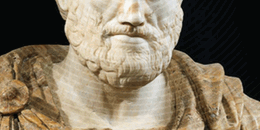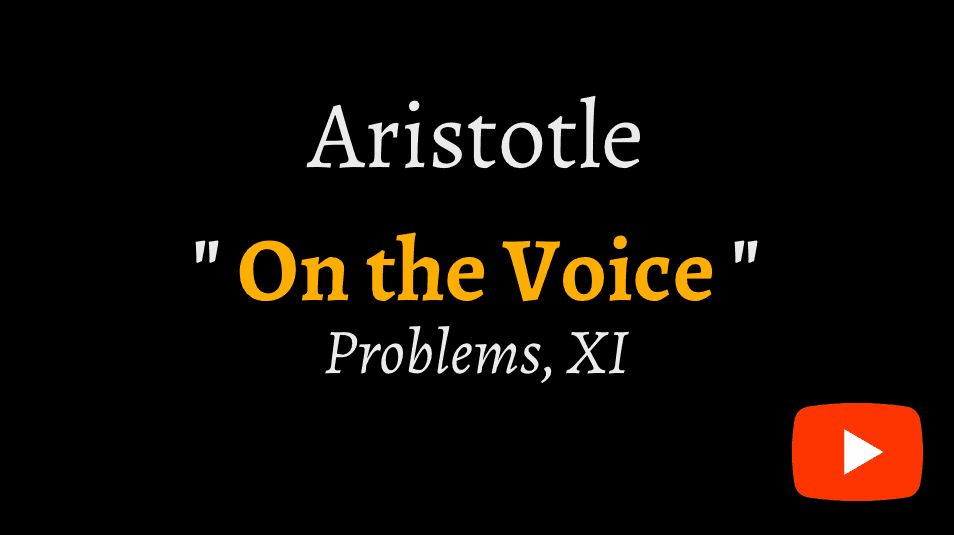• On the Voice •
• Aristotle •

Duration: 50 m 35 s
Unabridged
Recorded: 2018
Price : $20
About Aristotle's “On the Voice”
In this short work, which is included in the “Problems” collection (usually as “Book 11”), Aristotle expresses concerns-questions about the voice and tries to give a logical and sometimes scientific answer.
In particular, he poses questions such as “why, in some cases, the voice is heavier or more acute”, “why does a sharp voice sound farther away than a heavy one”, “tone of voice”, yawning and breathing related to hearing”, “why the drunken have a heavier voice than sober people”, “how does echo appear”, “why outside noises sound better in the interior and not vice versa”, “why young people have a more pronounced voice”, “why do anxious persons have a heavier voice” and many more similar ones.
Aristotle’s answers to each of these questions is centred on the nature of air and whether it is directly related to speed, temperature, bodily condition, weather and atmospheric conditions.
Both questions, as well as Aristotle’s answers to them, awakes, in turn, the reader’s wonder and curiosity about “how do all these things happen?”
You can follow an English translation online at Archive.org, or the original Greek text at Wikisource.
About the Aristotelian "Problems"
Aristotle’s “Problems” contain questions-reflections on various areas of knowledge. In this collection you can find a variety of themes that come from simple everyday things and habits, which are usually not observed or questioned about their essence.
Specifically, “Problems” include works such as: medical matters, fragrance, about the living, about the inanimate, the voice, harmony, about the air, about the righteousness and injustice, over the whole body, and many more.
About Aristotle
Aristotle, one of the most important philosophers of Antiquity, was born in 385 BCE in Stageira of Chalkidike. Born in a rich family he had the opportunity to get high education. From 367 BCE on and for about twenty years, he studied philosophy in Athens by Plato and also taught in his Academy. After the death of Plato he moved to the city of Assus in Asia Minor, where he taught philosophy until 345 BCE., when he accepted an invitation by Theophrastus to teach in Mytilene. In 342 BCE King Philippus asked him to teach his 13 years old son, Alexander. After the death of Philippus Aristotle returned to Athens and established the “Lyceum”, where he set his teaching forth. However, after the death of Alexander in 323 BCE and having been accused by opponents for disrespect, he retired in Chalkis. He died in 322 BC. from some stomach disease.
Aristotle left a lot of works. The works that have survived are distinguished in logical, physical, biological, psychological, metaphysical, moral, political, technological and various problems.
The Aristotelian works have included the following, which are not considered genuine: Physiognomy, About Miraculous Things Heard, About Colours, Mechanics, Rhetoric to Alexander and On Hearing.
About the audiobook
 The recording contains the complete, unabridged Ancient Greek text of “On the Voice”.
After purchase you will be able to download the zip file, containing both mp3 and m4b formats. The m4b format is bookmarkable and offers better sound quality.
The recording contains the complete, unabridged Ancient Greek text of “On the Voice”.
After purchase you will be able to download the zip file, containing both mp3 and m4b formats. The m4b format is bookmarkable and offers better sound quality.
You can listen to some of the questions and responses, to form an idea about the present audiobook in the following video. Thank you!
